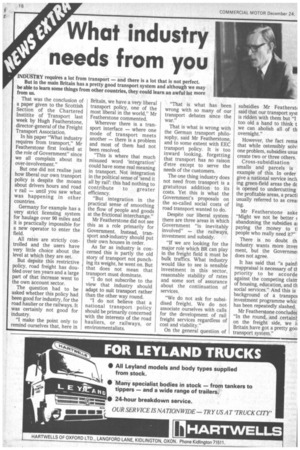What industry needs from you
Page 18

Page 19

If you've noticed an error in this article please click here to report it so we can fix it.
INDUSTRY requires a lot from transport — and there is a lot that is not perfect.
But in the main Britain has a pretty good transport system and although we may be able to learn some things from other countries, they could learn an awful lot more from us.
That was the conclusion of a paper given to the Scottish Section of the Chartered -Institite of Transport last week by Hugh Featherstone, director-general of the Freight Transport Association.
In his paper "What industry requires from transport," Mr Featherstone first looked at the role of Government" since we all complain about its over-involvement."
But one did not realise just how liberal our own transport policy is despite the moans about drivers hours and road v rail — until you saw what was happening in other countries.
Germany for example has a very strict licensing system for haulage over 90 miles and it is practically impossible for a new operator to enter the field.
All rates are strictly controlled and the users have very little choice about the level at which they are set.
But depsite this restrictive policy, road freight has doubled over ten years and a large part of that increase went to the own account sector.
The question had to be asked whether this policy had been good for industry, for the road haulier or the railways. It was certainly not good for industry.
"I make the point only to remind ourselves that, here in Britain, we have a very liberal transport policy, one of the most liberal in the world," Mr Featherstone commented.
Wherever there is a transport interface — where one mode of transport meets another — there is a problem and most of them had not been resolved.
"This is where that much misused word 'integration' could have some real meaning in transport. Not integration in the political sense of 'send it all by rail': this had nothing to contribute to greater efficiency.
"But integration in the practical sense of smoothing the flow of people and goods at the frictional interchange."
Mr Featherstone did not see this as a role primarily for Government. Instead, transport and. industry should put their own houses in order.
As far as industry is concerned this is partly the old story of transport not punching its weight, he went on. But that does not mean that transport must dominate.
"I do not subscribe to the view that industry should adapt to suit transport rather than the other way round.
"I do not believe that a national transport policy should be primarily concerned with the interests of the road hauliers, or railways, or environmentalists. "That is what has been wrong with so many of our transport debates since the war."
That is what is wrong with the German transport philosophy, said Mr Featherstone, and to some extent with EEC transport policy. It is too inward looking, forgetting that transport has no raison d'etre except to serve the needs of the customers.
The one thing industry does not need from transport is a gratuitous addition to its costs. Yet this is what the Government's proposals on the so-called social costs of road transport wanted to do.
Despite our liberal system • there are three areas in which Government "is inevitably involved" — the railways, investment and subsidy.
"If we are looking for the major role which BR can play in the freight field it must be bulk traffics. What industry would like to see is sensible investment in this sector, reasonable stability of rates and some sort of assurance about the continuation of services.
"We do not ask for subsidised freight. We do notassociate ourselves with calls for the development of rail freight services regardless of cost and viability."
On the general question of subsidies Mr Featherst4 said that our transport sys1 is ridden with them but "I too old a hand to think t we can abolish all of th overnight."
However, the fact rema that while ostensibly solvi one problem, subsidies usua create two or three others.
Cross-subsidisation smalls and parcels is example of this. In order give a national service inch ing green-field areas the dc is opened to undercutting the profitable areas, a practi usually referred to as crew ing.
Mr Featherstone aske "Might we not be better ( abandoning the subsidies ai paying the money to ti people who really need it?"
There is no doubt th industry wants more inves. ment, but the Governmei does not agree.
It has said that "a painft reappraisal is necessary of tF priority to be accorde against the competing clairr of housing, education, and th social services." And this is background of a transpoi investment programme whic has been repeatedly slashed.
Mr Featherstone concludec "In the round, and certain': on the freight side, we ii Britain have got a pretty goo transport system."
me bring you tidings of at joy this Christmastide -t from the East but from the rth, where stars appear to popping up all over. I hear that things are real ght up there in the centre of
? manufacturing industry_ ke Magirus Deutz. now
3nk Tinsdale, the chairman, a man who plays his cards ry close to his chest, but len our man was up there 5t week Frank was in an pensive mood.
The present MD ;commodation is apparently ?ginning to burst at the :arm, a new assembly area is ?ing laid out, the training • ea is being extended and the ores organisation expanded. ot, we are assured, to meet a rojected demand alone but in rder to cope with the here rid now requirements. And you should see the new lagirus dump truck body. his is really something and ae it you will soon, we are ssured. Something else to 3ok out for is the new Iveco adiator badge, which Frank is low mounting on his nachines.
The men from Maggie, by he way, reckon to have istablished something of a ecord in the stores section. ;ince 1973 they have been lolding four half-shafts in ;tock. Only one has moved 3nd it went to a dealer, who, Nould you believe, is holding it ,n stock. These must be the only half-shafts in Britain that don't move.




































































